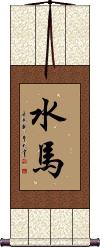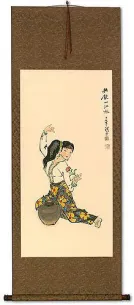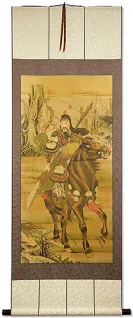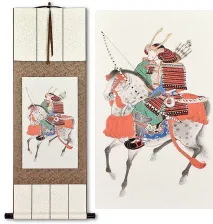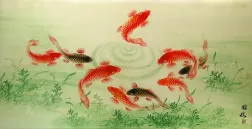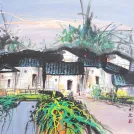Many custom options...
And formats...

Water Horse in Chinese / Japanese...
Buy a Water Horse calligraphy wall scroll here!
Water Horse
The Year of the Water Horse
水馬 is Water Horse in Chinese.
In the Chinese zodiac and sexagenary (60-year) cycle, this combination occurs in years that include 1882, 1942, 2002, and 2062.
In the sexagenary cycle, this year is represented by 壬午.
See Also: Horse
This in-stock artwork might be what you are looking for, and ships right away...
Gallery Price: $240.00
Your Price: $98.88
Gallery Price: $144.00
Your Price: $79.88
Gallery Price: $121.00
Your Price: $66.88
Decorative Colorful Abstract Horse Painting
Discounted Blemished
Gallery Price: $90.00
Your Price: $39.00
Gallery Price: $124.00
Your Price: $68.77
Gallery Price: $200.00
Your Price: $79.88
Gallery Price: $108.00
Your Price: $59.88
Gallery Price: $72.00
Your Price: $39.88
Gallery Price: $448.00
Your Price: $248.88
Not the results for water horse that you were looking for?
Below are some entries from our dictionary that may match your water horse search...
| Characters If shown, 2nd row is Simp. Chinese |
Pronunciation Romanization |
Simple Dictionary Definition | ||||||||||||||||||||||||||||||||||||||||||||||||||||||||||||
水馬 水马 see styles |
shuǐ mǎ shui3 ma3 shui ma mizuma みずま |
More info & calligraphy: Water Horsecrossing water with a horse; (surname) Mizuma |
||||||||||||||||||||||||||||||||||||||||||||||||||||||||||||
鑁 see styles |
wàn wan4 wan ban ばん |
(surname) Ban Translit. vaṃ, associated with water and the ocean; also, the embodiment of wisdom. |
||||||||||||||||||||||||||||||||||||||||||||||||||||||||||||
先陀 see styles |
xiān tuó xian1 tuo2 hsien t`o hsien to senda |
(先陀婆) Saindhava, interpreted as salt, a cup, water, and a horse; born or produced in Sihdh, or near the Indus; also a minister of state in personal attendance on the king. | ||||||||||||||||||||||||||||||||||||||||||||||||||||||||||||
四達 四达 see styles |
sì dá si4 da2 ssu ta yotsudachi よつだち |
(surname) Yotsudachi saindhava, 先陀婆 rock-salt, but intp. as salt, water, a utensil, and a horse, the four necessaries, i. e. water for washing, salt for food, a vessel to contain it, and a horse for progress; also called 四實. |
||||||||||||||||||||||||||||||||||||||||||||||||||||||||||||
壬午 see styles |
rén wǔ ren2 wu3 jen wu mizunoeuma; jingo みずのえうま; じんご |
nineteenth year I7 of the 60 year cycle, e.g. 2002 or 2062 (See 干支・1) Water Horse (19th term of the sexagenary cycle, e.g. 1942, 2002, 2062) |
||||||||||||||||||||||||||||||||||||||||||||||||||||||||||||
馬蹄 马蹄 see styles |
mǎ tí ma3 ti2 ma t`i ma ti batei / bate ばてい |
horse's hoof; horseshoe; Chinese water chestnut (Eleocharis dulcis or E. congesta) horse's hooves |
||||||||||||||||||||||||||||||||||||||||||||||||||||||||||||
どうどう see styles |
dododou / dododo ドゥドウ |
(adv-to,adv) (1) (onomatopoeic or mimetic word) with a roaring sound (of water or wind); sound of feet stamping on the ground; (interjection) (2) (See どう) whoa! (command used to stop or quieten down a horse, etc.); (personal name) Dudow | ||||||||||||||||||||||||||||||||||||||||||||||||||||||||||||
五智如來 五智如来 see styles |
wǔ zhì rú lái wu3 zhi4 ru2 lai2 wu chih ju lai gochi nyorai |
五智五佛; 五佛; 五如來 The five Dhyāni-Buddhas, or Wisdom-Tathāgatas of the Vajradhātu 金剛界, idealizations of five aspects of wisdom; possibly of Nepalese origin. The Wisdom Buddha represents the dharmakāya or Buddha-mind, also the Dharma of the triratna, or trinity. Each evolves one of the five colours, one of the five senses, a Dhyani-bodhisattva in two forms onegracious, the other fierce, and a Mānuṣi-Buddha; each has his own śakti, i. e. feminine energy or complement; also his own bīja, or germ-sound 種子or 印 seal, i. e. 眞言 real or substantive word, the five being for 大日 aṃ, for 阿閦 hūṃ, for 寶生 ? hrīḥ, for 彌陀 ? aḥ, for 不 空 ? āḥ. The five are also described as the emanations or forms of an Ādi-Buddha, Vajrasattva; the four are considered by others to be emanations or forms of Vairocana as theSupreme Buddha. The five are not always described as the same, e. g. they may be 藥師 (or 王) Bhaiṣajya, 多寶 Prabhūtaratna, Vairocana, Akṣobhya, andeither Amoghasiddhi or Śākyamuni. Below is a classified list of the generally accepted five with certain particulars connected with them, butthese differ in different places, and the list can only be a general guide. As to the Dhyāni-bodhisattvas, each Buddha evolves three forms 五佛生五菩薩, 五金剛, 五忿怒, i. e. (1) a bodhisattva who represents the Buddha's dharmakāya, or spiritual body; (2) a vajra ordiamond form who represents his wisdom in graciousness; and (3) a fierce or angry form, the 明王 who represents his power against evil. (1) Vairocanaappears in the three forms of 轉法輪菩薩 Vajra-pāramitā Bodhisattva, 遍照金剛 Universally Shining Vajrasattva, and 不動明王 Ārya-Acalanātha Rāja; (2) Akṣobhya's three forms are 虛空藏 Ākāśagarbha, 如意 complete power, and 軍荼利明王 Kuṇḍalī-rāja; (3 ) Ratnasaṃbhava's are 普賢 Samantabhadra, 薩埵Sattvavajra, and 孫婆 or 降三世明王 Trailokyavijayarāja; (4) Amitābha's are 觀世音 Avalokiteśvara, 法金剛 Dharmarāja, and 馬頭明王 Hayagrīva, thehorse-head Dharmapāla; (5) Amoghasiddhi's are 彌勒 Maitreya, 業金剛Karmavajra, and 金剛夜叉 Vajrayakṣa. The above Bodhisattvas differ from those in the following list:
Arrival of the five wise Buddhas |
||||||||||||||||||||||||||||||||||||||||||||||||||||||||||||
牛不喝水難按角 牛不喝水难按角 see styles |
niú bù hē shuǐ nán àn jiǎo niu2 bu4 he1 shui3 nan2 an4 jiao3 niu pu ho shui nan an chiao |
(idiom) you can lead a horse to water but you cannot make it drink | ||||||||||||||||||||||||||||||||||||||||||||||||||||||||||||
Variations: |
doudou; doodoo / dodo; doodoo どうどう; ドードー |
(adv-to,adv) (1) (onomatopoeic or mimetic word) with a roaring sound (of water or wind); sound of feet stamping on the ground; (interjection) (2) (See どう) whoa! (command used to stop or quieten down a horse, etc.) | ||||||||||||||||||||||||||||||||||||||||||||||||||||||||||||
師父領進門,修行在個人 师父领进门,修行在个人 |
shī fu lǐng jìn mén , xiū xíng zài gè rén shi1 fu5 ling3 jin4 men2 , xiu1 xing2 zai4 ge4 ren2 shih fu ling chin men , hsiu hsing tsai ko jen |
the master leads you to the door, the rest is up to you; you can lead a horse to water but you can't make him drink | ||||||||||||||||||||||||||||||||||||||||||||||||||||||||||||
Variations: |
hiku ひく |
(transitive verb) (1) to pull; to tug; to lead (e.g. a horse); (transitive verb) (2) (also written as 惹く) (See 注意を引く) to draw (attention, sympathy, etc.); to attract (e.g. interest); (transitive verb) (3) to draw back (e.g. one's hand); to draw in (one's chin, stomach, etc.); to pull in; (transitive verb) (4) to draw (a card, mahjong tile, etc.); (transitive verb) (5) (See 図面を引く) to draw (a line, plan, etc.); (transitive verb) (6) (See 風邪を引く) to catch (a cold); (transitive verb) (7) (usu. written as 弾く) to play (a stringed or keyboard instrument); (transitive verb) (8) (See 辞書を引く) to look up (in a dictionary, phone book, etc.); to consult; to check; (transitive verb) (9) (esp. 牽く) to haul; to pull (vehicles); (transitive verb) (10) to subtract; to deduct; (transitive verb) (11) to recede; to ebb; to fade; (transitive verb) (12) to be descend from; to inherit (a characteristic); (transitive verb) (13) to quote; to cite; to raise (as evidence); (transitive verb) (14) to lay on (electricity, gas, etc.); to install (e.g. a telephone); to supply (e.g. water); (transitive verb) (15) to hold (e.g. a note); (transitive verb) (16) to apply (e.g. lipstick); to oil (e.g. a pan); to wax (e.g. a floor); (v5k,vi) (17) (also written as 退く) to move back; to draw back; to recede; to fall back; to retreat; (v5k,vi) (18) (also written as 退く) to lessen; to subside; to ebb; to go down (e.g. of swelling); (v5k,vi) (19) (also written as 退く) to resign; to retire; to quit; (v5k,vi) (20) (colloquialism) to be put off (by someone's words or behaviour); to be turned off; to recoil (in disgust, etc.); to cringe | ||||||||||||||||||||||||||||||||||||||||||||||||||||||||||||
牽馬到河易,強馬飲水難 牵马到河易,强马饮水难 |
qiān mǎ dào hé yì , qiǎng mǎ yǐn shuǐ nán qian1 ma3 dao4 he2 yi4 , qiang3 ma3 yin3 shui3 nan2 ch`ien ma tao ho i , ch`iang ma yin shui nan chien ma tao ho i , chiang ma yin shui nan |
You can lead a horse to water, but you can't make him drink. (idiom) |
The following table may be helpful for those studying Chinese or Japanese...
| Title | Characters | Romaji (Romanized Japanese) | Various forms of Romanized Chinese | |
| Water Horse | 水馬 水马 | shuǐ mǎ / shui3 ma3 / shui ma / shuima | ||
| In some entries above you will see that characters have different versions above and below a line. In these cases, the characters above the line are Traditional Chinese, while the ones below are Simplified Chinese. | ||||
Successful Chinese Character and Japanese Kanji calligraphy searches within the last few hours...
